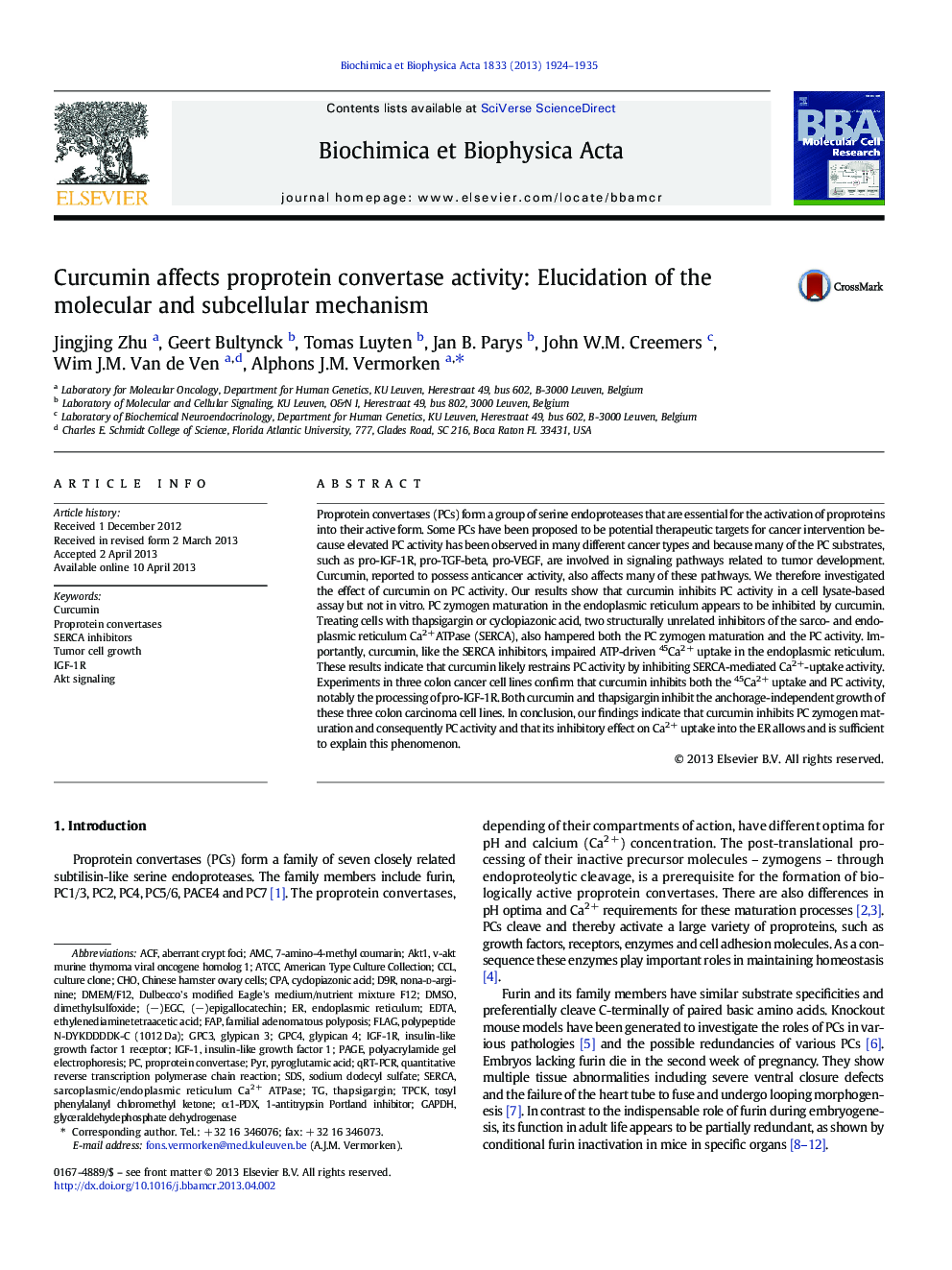| Article ID | Journal | Published Year | Pages | File Type |
|---|---|---|---|---|
| 10802361 | Biochimica et Biophysica Acta (BBA) - Molecular Cell Research | 2013 | 12 Pages |
Abstract
Proprotein convertases (PCs) form a group of serine endoproteases that are essential for the activation of proproteins into their active form. Some PCs have been proposed to be potential therapeutic targets for cancer intervention because elevated PC activity has been observed in many different cancer types and because many of the PC substrates, such as pro-IGF-1R, pro-TGF-beta, pro-VEGF, are involved in signaling pathways related to tumor development. Curcumin, reported to possess anticancer activity, also affects many of these pathways. We therefore investigated the effect of curcumin on PC activity. Our results show that curcumin inhibits PC activity in a cell lysate-based assay but not in vitro. PC zymogen maturation in the endoplasmic reticulum appears to be inhibited by curcumin. Treating cells with thapsigargin or cyclopiazonic acid, two structurally unrelated inhibitors of the sarco- and endoplasmic reticulum Ca2Â +ATPase (SERCA), also hampered both the PC zymogen maturation and the PC activity. Importantly, curcumin, like the SERCA inhibitors, impaired ATP-driven 45Ca2Â + uptake in the endoplasmic reticulum. These results indicate that curcumin likely restrains PC activity by inhibiting SERCA-mediated Ca2Â +-uptake activity. Experiments in three colon cancer cell lines confirm that curcumin inhibits both the 45Ca2Â + uptake and PC activity, notably the processing of pro-IGF-1R. Both curcumin and thapsigargin inhibit the anchorage-independent growth of these three colon carcinoma cell lines. In conclusion, our findings indicate that curcumin inhibits PC zymogen maturation and consequently PC activity and that its inhibitory effect on Ca2Â + uptake into the ER allows and is sufficient to explain this phenomenon.
Keywords
AmCPYRGPC3TPCKAkt1Tumor cell growthCCLIGF-1RFAPThapsigarginATCCIGF-1PAGEqRT-PCRACFCPAglyceraldehydephosphate dehydrogenaseGAPDHSDS7-amino-4-methyl coumarinAKT signalingDMEM/F12DMSOv-akt murine thymoma viral oncogene homolog 1EDTAEthylenediaminetetraacetic acidCyclopiazonic acidPyroglutamic acidpolyacrylamide gel electrophoresisChoTosyl phenylalanyl chloromethyl ketoneDimethylsulfoxidesodium dodecyl sulfateChinese hamster ovary cellsendoplasmic reticuluminsulin-like growth factor 1aberrant crypt fociSERCAAmerican Type Culture Collectionquantitative reverse transcription polymerase chain reactionProprotein convertasesproprotein convertaseFlagfamilial adenomatous polyposisCurcuminGlypican 3insulin-like growth factor 1 receptor
Related Topics
Life Sciences
Biochemistry, Genetics and Molecular Biology
Biochemistry
Authors
Jingjing Zhu, Geert Bultynck, Tomas Luyten, Jan B. Parys, John W.M. Creemers, Wim J.M. Van de Ven, Alphons J.M. Vermorken,
